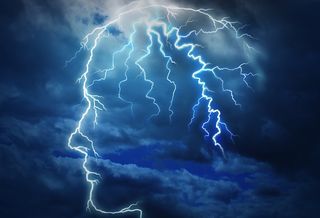Why Would Someone Have a Seizure Once Then Never Again
New Advice on What To Do About Seizures

WASHINGTON — One out of 10 people will experience a seizure at some point in life, simply most will never have second episode. As a effect, patients and their doctors have a difficult time deciding whether a person who has i seizure should take medication in hopes of preventing another incident, researchers say.
Now, a new guideline announced here today (April twenty) at the American Academy of Neurology annual meeting may offer some advice for this gray area.
Currently, most patients and doctors end up waiting, without handling, to run into if a second seizure occurs, said Dr. Jacqueline French, a neurology professor at the NYU Langone Medical Center in New York. That'southward because, if left untreated, almost l to 75 percent of patients volition never have another seizure.
The new seizure guideline may change this practice of waiting, said French, who was senior author on the new recommendation. The guideline offers doctors suggestions, based on certain results seen on EEG or MRI tests, well-nigh which patients would likely benefit from starting medication correct away.
"The guideline is actually useful in that it is putting a niggling curtsy around the doubt," French said. "It is giving people a number of [examples] that would signal that the likelihood of a recurrent seizure is higher. And therefore they can put that into their risk-benefits assessment."
That run a risk, French explained, is a residuum between the risk of having a 2d seizure, which could be deadly depending on where and when it happens, versus taking medication that might non exist necessary. And that medication could take side furnishings. [seven Bizarre Drug Side Effects]
The new seizure guideline, issued by the American University of Neurology and the American Epilepsy Society, is published in the Apr 21 issue of the journal Neurology.
Seizures can take on many forms. Amongst the more than visible is the tonic-clonic or grand mal seizure, in which a person loses consciousness, clenches up and and then has convulsions for upward of several minutes. Just more often, seizures can result in short loss of consciousness, or a blank stare and upward rotation of the eyes, with no clenching or convulsions.
In the United states, epilepsy is defined as having ii or more seizures that are "unprovoked," significant they are not due to other underlying triggers, such every bit a high fever or low claret sugar. People'southward take chances of having a second unprovoked seizure, and subsequent diagnosis of epilepsy, is greatest inside the showtime two years following a first incident.
French compared seizures to house fires: Some are sparked by chance and won't likely occur again, but others could be the event of faulty wiring, and could render if the wiring problem is not stock-still. Epilepsy medication helps ameliorate faulty encephalon wiring, French told Live Science.
The new guideline, however, "is not a elementary, blackness-and-white recommendation," said Dr. Allan Krumholz of the Academy of Maryland School of Medicine, lead writer on the guideline report. Instead, the decision "must be made on an individual basis," he said.
Whatever unprovoked first seizure should prompt firsthand medical attention, Krumholz said. Tools such as electroencephalogram (EEG) or an MRI can reveal a whether a person is at increased hazard for seizure recurrence, studies have known. Thus, doctors should not go along "to make knee-jerk decisions" to wait to see if a second seizure occurs, Krumholz said.
Doctors must also retrieve that a then-called first seizure might not actually be the first, because seizures tin can go undetected, French stressed.
The guideline, in short, summarizes all that is known nearly controlling seizures and defines the uncertainties of the risks in linguistic communication for both the doctor and the patient.
While the idea of taking anti-epileptic drugs for the 25- to 50-percentage chance of recurrence may seem extreme to some, French said this is much like taking a statin drug to reduce the risk of a heart attack. The adventure of a second seizure, in this comparison, is far greater than the gamble of a middle assault faced by most of those prescribed statins, she said.
"When y'all beginning on a medication, yous haven't decided if you are going to ally it. Yous're just dating," French said. "You have fourth dimension to figure out if this is going to work out for you lot or not. The proficient news is that there are a number of drugs we could give you in 2015 [to effectively control seizure recurrence] that don't have serious, life-threatening side furnishings."
The almost important element of the guideline is a "meaningful conversation betwixt the patient and physician so that the patient's … personal preferences are understood and accounted for," French said.
Follow Christopher Wanjek @wanjek for daily tweets on health and scientific discipline with a humorous edge. Wanjek is the author of "Food at Work" and "Bad Medicine." His column, Bad Medicine, appears regularly on Live Science.
attawayaturneve69.blogspot.com
Source: https://www.livescience.com/50538-seizures-epilepsy-guidelines.html

0 Response to "Why Would Someone Have a Seizure Once Then Never Again"
Post a Comment